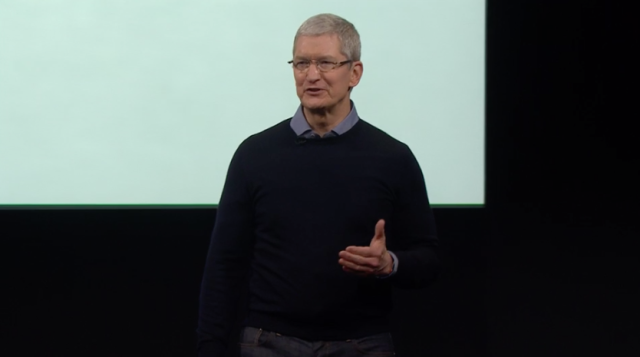
Just a month ago, the Federal Bureau of Investigation accused Apple of a public relations marketing stunt when the company refused to comply with a court order to help the bureau unlock an iPhone used by one of the San Bernardino shooters.
"Apple’s current refusal to comply with the Court’s Order, despite the technical feasibility of doing so, instead appears to be based on its concern for its business model and public brand marketing strategy,” Justice Department attorneys wrote in a court filing. Those remarks came days after Apple CEO Tim Cook published a message on the gadget maker's website telling consumers that the government's "overreach" would "undermine the very freedoms and liberty our government is meant to protect." In Cook's eyes, Apple was being asked to implement a backdoor of sorts to its mobile phone's encryption.
But would Cook take his biggest stage, during the latest product launch of new shiny gadgets on Monday, and again rail against the government's demands? Would Cook, or anybody from Apple, take a swipe at the government and play into its hands while unveiling a new iPad, iPhone, or other product during a live-streamed event from company headquarters? Would that happen just one day before the much-anticipated court hearing?
It didn't take long. Just moments after the event started, Cook indeed brought up the topic without even mentioning the FBI, encryption, or terrorism.
"We built the iPhone for you, our customers. And we know it is a deeply personal device," he said. "We did not expect to be in this position at odds with our own government. But we believe strongly that we have a responsibility to help you protect your data and protect your privacy. We owe it to our customers and we owe it to our country. This is an issue that impacts all of us."
The war of words aside, for now the issue is left in the hands of Magistrate Sheri Pym in Riverside, California. She already ordered Apple to help unlock the phone last month but did so without giving Apple a chance to challenge it. Tuesday's hearing is about providing Apple that opportunity. Between these two court events, there's been plenty of he-said, she-said arguments from both sides.
At its core, the issue boils down to whether an American company may produce a product that is impenetrable by the authorities and then be forced by the government to weaken its security. FBI Director James Comey told a House panel earlier this month that no company should be above the law, and he believes that Apple should comport with the magistrate's order. The director declined to label it a backdoor.
"There is already a door on that iPhone. We’re essentially asking Apple to take that vicious guard dog away," Comey testified.
Comey said he doesn't know what would be found on the phone, but he feels the surviving victims of the December attack in San Bernardino County deserve the government leaving no stone unturned. Comey and the Department of Justice have repeatedly said a 1789 law allows judges to issue orders even when there's no law on the books requiring companies to undertake the unprecedented steps being asked of Apple. San Bernardino County District Attorney Michael Ramos went so far as to say the seized iPhone may contain evidence "that it was used as a weapon to introduce a lying dormant cyber pathogen that endangers San Bernardino County's computer infrastructure." Ramos later said he had no evidence for that statement.
Among the arguments Apple will make Tuesday is that the government has provided no compelling reason to force the company to write code that undermines its security. Apple believes being forced to comply would be a breach of its First Amendment right of speech to write code as it sees fit. The gadget maker also argues that the Fifth Amendment is being violated, too, because the government is conscripting Apple to "become agents for the government."
Ars will be in the courtroom to cover the Pym hearing Tuesday. No matter the outcome, Judge Pym's decision is expected to be appealed in a legal process that could take months or even years to play out.
Apple's Cupertino event has just concluded, and you can revisit all the action in our liveblog. We'll update this post as new information becomes available.
reader comments
88